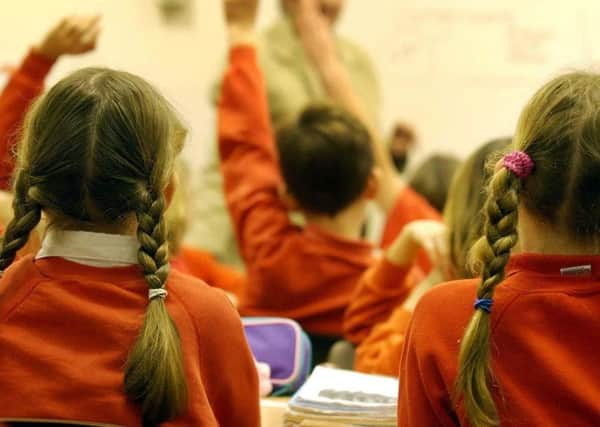Jonathan Taylor: Conformity will not improve education


This isn’t an attack on ISI particularly, but against the zeitgeist. I recognise that my objection might be just the cry of a grumpy old man. I might be better off just putting up with inspection when it happens, and keep quiet, particularly when our final judgment was such a good one.
But when I recall just what the inspection entailed for the school – taking key staff away from their proper responsibilities – I think I ought to argue the case publicly.
Advertisement
Hide AdAdvertisement
Hide AdI am trusted by my governors to run a successful school. In turn, I trust my staff to do the job I’ve appointed them to do.
I don’t just put my feet up and let them get on with it, I look carefully and individually at what they are doing, and weigh up the evidence for their success or failure. I do that by talking, watching and judging. I don’t measure them against a checklist.
Similarly, we trust our students: possibly more than other schools do, but not as an indulgence. Our students won’t grow if they’re not given a degree of freedom. They won’t mature unless they’re given responsibility for their own actions. They won’t learn unless they’re allowed to fail.
It’s a seamless whole: what I believe in as an educator, I believe in as an employer. We grow as adults because we respond to the encouragement and trust of our managers; we grow as students because we respond to the encouragement and trust of our teachers.
Advertisement
Hide AdAdvertisement
Hide AdExcept that inspection is not about trusting, nor about individual conversations, but is all about measurable grades on formulaic grids.
The trouble is this sort of inspection encourages conformity and a playing of the system to ensure compliance, even if that has no beneficial effect on education. Human nature doesn’t change much over time. So it’s no surprise to find that our current culture of checks, inspections, interventions and grading – in the NHS, in schools, in most areas of professional life – hasn’t actually changed human nature.
We bring in safeguards to kid ourselves that they will curtail deviance and raise standards, but while schools are deemed to be better than ever, teenagers are no happier, politicians are no wiser, mental health problems abound, the suicide rate amongst young men is frighteningly high. And because we know more about some adults’ depraved attitudes towards children, the problem of paedophilia seems to be more extensive than ever. You don’t change human nature by regulatory regimes.
A strong inspection regime makes those subject to it try their hardest to conform. Over time, they will meet the regulations. The situation will look as if it’s improving. Actually, it’s just that more people – institutions, schools – are conforming to the criteria grid. The test becomes a self-fulfilling exercise in ‘improvement’. All that improves is the adherence to the criteria of the test.
Advertisement
Hide AdAdvertisement
Hide AdI was struck by how easy it would be to doctor files to be compliant, and how one could in fact play games with the system. That’s because the system itself becomes the thing that matters, not the probity, effectiveness or consequence of the educational system on offer. It’s like the target culture in the NHS: you can chase the target, and miss the sick patient.
My distrust of the inspection regime rests also on the validity of single-word judgments. I appreciate that there is a ‘grade descriptor’ behind the one-word judgment. But the short-hand merely encourages over-simplification, and lessens the helpfulness of the judgment. The single word is too bland, too impersonal, and in averaging out a range, becomes meaningless.
This reaches absurd significance in the state sector, where heads now define themselves as heads of ‘outstanding’ schools, or ‘good schools with outstanding features’. On those few words hang their very careers.
Therefore, they insist on close attention to measures of student progress which inform those judgments. So, teachers are obliged to concentrate on their students’ appreciation not of chemistry, or Shakespeare, or the finer tactics of a netball game, but of their ‘levels’.
Advertisement
Hide AdAdvertisement
Hide AdMore time is spent talking about the level – actual, aspirations, required – than in teaching. Students are taught the precise gobbet which will ‘bring them up a level’. This is not education. It’s about playing the inspection game. And what’s true on an individual student level is also true at a school level. I don’t want my school to become like that. Although I confess that I do, sadly, hear myself talking about Bootham having achieved six “excellents”.
So: I have learnt nothing from the experience. I had excellent, supportive responses from student and parent questionnaires – I knew I would. I had inspectors being really impressed at my students’ moral, social, cultural and spiritual development – I knew they would be. My curriculum provision, my extracurricular provision was excellent, as were my boarding, my safeguarding, welfare health and safety, leadership and management: know what? – I knew that, too.
This isn’t the moment to suggest minor changes to a regime which I dislike: it’s hard to improve something which starts from entirely the wrong premise. And what of the latest we hear of a radical overhaul for Ofsted, which talks of less time being spent on classroom observation and even more on grid-box checking; does that sound like it will give the answer? Somehow, I think not.
• Jonathan Taylor is headteacher of Bootham School in York.